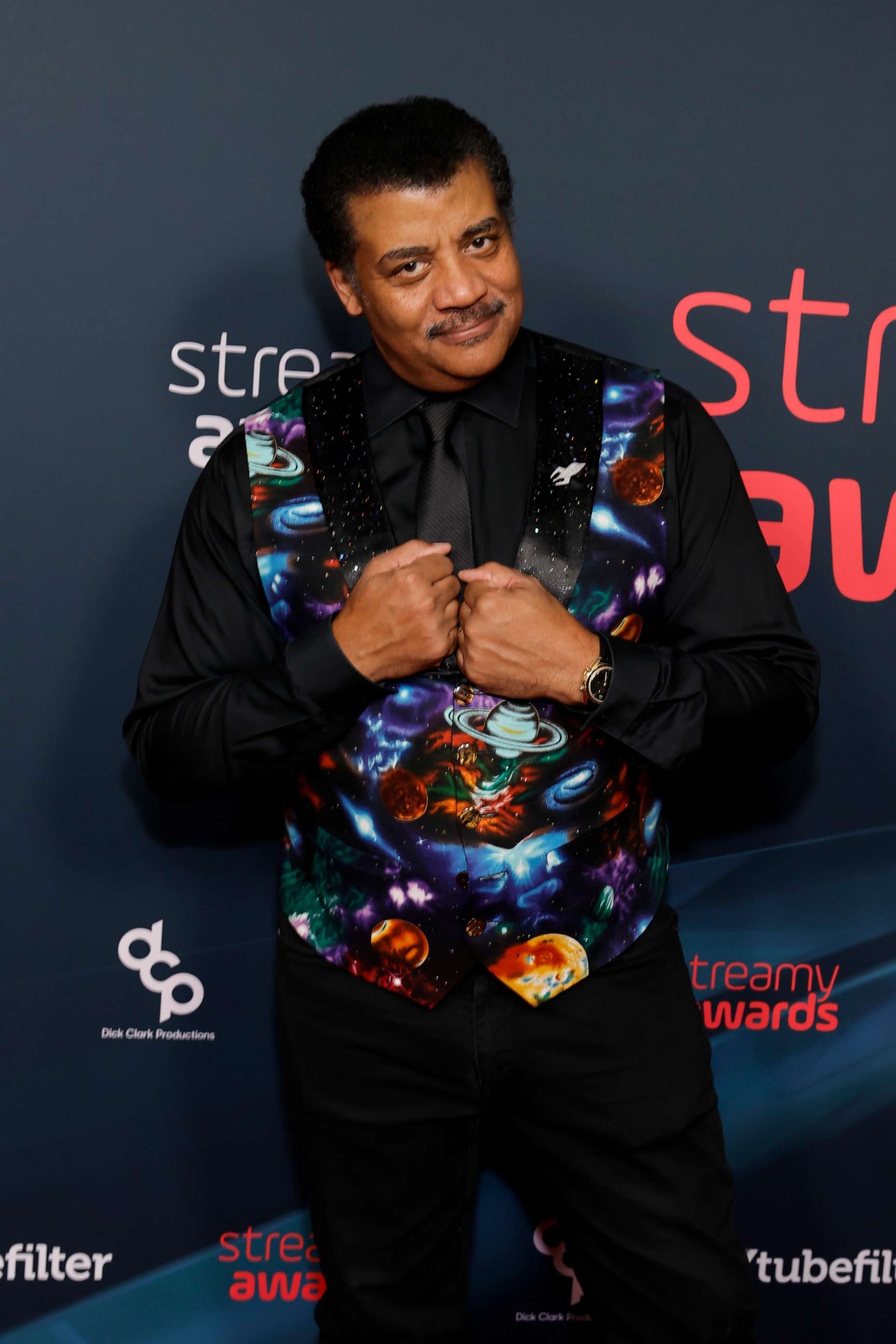Neil deGrasse Tyson brings journey through time and space to Earth in latest book
"To Infinity and Beyond: A Journey of Cosmic Discovery" was released Sept. 12.
Renowned astrophysicist Neil deGrasse Tyson has dedicated his life and career to learning about the cosmos and teaching it to the public with his signature wit and engaging charm. And his latest book, “To Infinity and Beyond: A Journey of Cosmic Discovery,” is no exception.
The book is co-authored by Lyndsey Nyx Walker, senior producer for the StarTalk podcast, in collaboration with National Geographic. The illustrated narrative takes readers through the mysteries of time and space, from planet Earth to the galaxies far outside our reach.
Tyson sat down with ABC News Live to discuss the new book, how it differs from his past works and what artificial intelligence means for the future galactic frontier.

LINSEY DAVIS: And joining us now is none other than Mr. Tyson himself. Great to have you here, Neil.
NEIL TYSON: Hello, thanks for having me back. Thanks for your interest.
DAVIS: Of course, always a pleasure.
TYSON: Well, the universe always calls to everyone, so I must have called to you.
DAVIS: It beckoned you. It summoned.
TYSON: It summoned me from the ether.
DAVIS: Yes, and you answered. We appreciate that.
TYSON: I was delighted.
DAVIS: You know, for us, ordinary Earthlings, the amount that we know about space is really often limited, really, to what we see in Hollywood. How do you feel that those depictions often miss the mark?
TYSON: So, good that you ask that, because this treatise – treatise, that overstates it – this is an account of humans' attempt to, you're here on Earth and you say, “Well, how would you ever reach the moon if you didn't have science?”
This is like a completely out of reach concept. And then you say, “Well, OK, now we're in space. How do we go farther? How would you visit the stars? How would you visit the galaxies, either physically or intellectually?
[Tyson notices an image on the monitor.] There's a wormhole there – we saw an image of one. That'd be good if we had wormholes. We don't.
So as we go on this journey of the mind and body, the DNA of this book tracks from my podcast, which is called StarTalk, which is the mixture of science, pop culture and humor. And what we find is that when we deliver science that way, people come back for more.
So as you learn this journey of how we ascended from Earth to reach the stars, there are movies that also touch those themes.
So we take a quick – it's not so much an off ramp – but it's the scenery that passes you, where you learn about how movies get some stuff right and other movies get it wrong. And that’s the pop culture dimension of this book.
DAVIS: And you have a lot of cultural references, photos, art.
TYSON: Oh yes, the book was produced by National Geographic. So, you know it's a beautiful book.
DAVIS: You have lots of books about space. How is this one different?
TYSON: This one’s different because, typically, you talk about discoveries. [Tyson notices an image on the monitor.] These are great visuals you got here. That’s the Crab Nebula. Love it.
How would you visit other stars? If I put you on a ship, you'll get there 50,000 years from now. So the ideas of a generational ship. Is that a realistic thing?
I think it's sort of philosophically, you're committing future generations of unborn to the mission that you started. And in a free country, that doesn't sound right to me. But that's the only way we can imagine visiting, all right? Maybe there's – we'll figure out a wormhole or something in the future.
So we track this. And plus, I get on the case when we talk about matter and what we do with it.
DAVIS: So you and [co-author] Lindsey Nyx Walker go on this journey together –
TYSON: Yes, so she is a longtime senior producer of StarTalk. So this is a StarTalk collaboration with National Geographic Books.
DAVIS: I do want to get in really quickly, because a lot of people are talking about artificial intelligence. What does artificial intelligence mean for the future galactic frontier?
TYSON: My field has been using AI as soon as it became available. There's neural nets to help you make decisions. You can make more creative decisions than you can with vast amounts of data.
And by the way, it's not just unique to my field. AI is everywhere. So if people – when ChatGPT came out and and it could write your term paper, people lost their minds over that. And I'm thinking, “OK, it finally can write your term paper, but it’s been doing my work ever since we could have it.”
And it beat us at Go [a board game], at Jeopardy – ABC product [Laughs] – and chess. And no one lost their minds from that. We were very impressed with it.
DAVIS: It wasn’t until we no longer had to write our own papers?
TYSON: Then, somehow that now you’re worried about it, OK?
DAVIS: So who wrote this book? That’s my question? [Davis laughs.]

TYSON: Oh. [Tyson laughs.] No, ChatGPT can’t write on content that has not been put on the internet. And the stuff [in the book], we put in there.
DAVIS: Neil, we always enjoy talking to you. I think only got through a fraction of my questions.
TYSON: Oh, yeah no. The universe is vast.
DAVIS: You can find all the answers to your own questions in his book. “To Infinity and Beyond” is now available wherever books are sold. Thank you.
TYSON: Thanks for having me.




